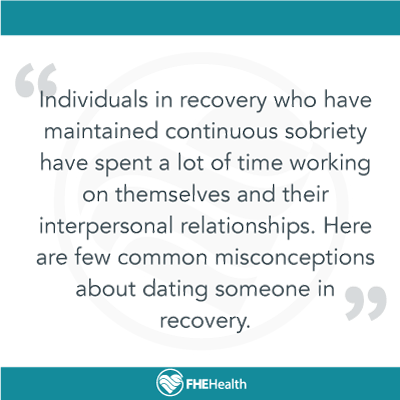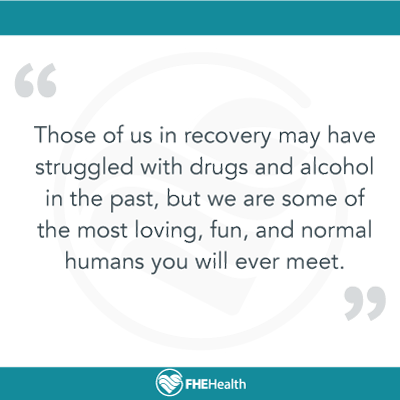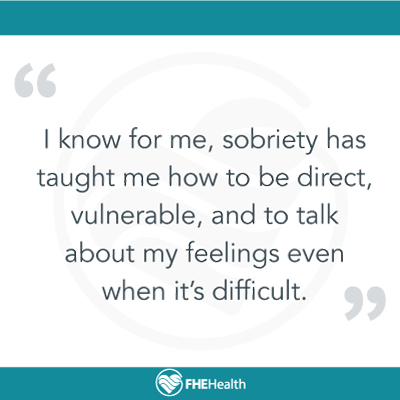
Dating, in general, is challenging. Not only are we living in unprecedented times due to COVID, but we are also living in an era where we have the world at our fingertips. Add in the component that your prospective partner is in recovery; it’s not unlikely that you may be a little nervous about pushing forward. Deciding to go on a date with someone who is recovering from substance abuse may seem scary. You may fall victim to believing the societal stigmas that surround addiction and addiction recovery. While it is an important subject to consider, dating someone in recovery is not necessarily a bad thing. After all, individuals in recovery who have maintained continuous sobriety have spent a lot of time working on themselves and their interpersonal relationships. Here are few common misconceptions about dating someone in recovery.
People in Recovery are Boring
 This concept always baffles me. I have been sober for 4 ½ years, and I can promise you I am many things, but boring is not one of them. I didn’t come out of the womb drinking and using drugs. To be honest, when I was abusing drugs and alcohol towards the end, I was certainly boring. I was emotionally detached and spent my days chasing my next high. I never really had much time for fun.
This concept always baffles me. I have been sober for 4 ½ years, and I can promise you I am many things, but boring is not one of them. I didn’t come out of the womb drinking and using drugs. To be honest, when I was abusing drugs and alcohol towards the end, I was certainly boring. I was emotionally detached and spent my days chasing my next high. I never really had much time for fun.
The question I get, more often than not, is, “Well, if you don’t drink, what do you do?” This question refers to what I could possibly be doing in my free time if I’m not at a bar or a friend’s drinking on the weekends. I don’t know – ANYTHING else. Because most of us in recovery wasted years chasing drugs and alcohol, most of us have replaced that longing with the lust of life. We enjoy spontaneous road trips, energetic concerts, peaceful hikes, adventurous activities, and lots of laughs. If you are considering dating someone in recovery, please know we are not boring. In fact, most of us are thrill-seeking, sometimes chaotic, and almost always up for a new venture.
Dating Someone in Recovery Comes with a lot of Baggage
Let me be the first to say, every breathing human has baggage. It’s the human experience of triumphs and failures that makes us who we are. However, for individuals in recovery, there seems to be a common misconception that we are all heavily burdened individuals who never fully recover from our past baggage. The irony of this myth is that in order for us to stay sober, we have to examine our pain from the past, heal, and move forward entirely.
This is not to say that we do not come with your average painful experiences from our pasts, but if we have actually immersed ourselves into recovery, then we have done the hard, internal work to move forward from these things. Men and women in recovery typically use drugs and alcohol to escape the pain. Therefore, getting sober, we learn that we must walk through and cope with these experiences in healthy ways. We have sponsors, sober support, and 12 step meetings that help us acknowledge and deal with any baggage that crops up. We don’t expect you to carry our issues.
You Can’t Date Someone in Recovery if You Haven’t Struggled with Addiction
 This is probably one of the most common misconceptions about dating someone in recovery. I have dated both men in recovery and men who have never struggled with addiction. I won’t lie; I was actually reluctant to date someone who was not in recovery, mostly because I did not know how I would feel if I was around someone having a drink at dinner. Now that I have maintained my sobriety for multiple years, I have come to realize that I didn’t get sober to remove myself from any situation in which alcohol may be present. In fact, I feel uncomfortable when “normal” people are uncomfortable to have a drink in front of me. I no longer have the desire to have a drink; therefore, it never bothers me if my family and friends who never struggled with drugs or alcohol have a drink when we are together. Those of us in recovery may have struggled with drugs and alcohol in the past, but we are some of the most loving, fun, and normal humans you will ever meet.
This is probably one of the most common misconceptions about dating someone in recovery. I have dated both men in recovery and men who have never struggled with addiction. I won’t lie; I was actually reluctant to date someone who was not in recovery, mostly because I did not know how I would feel if I was around someone having a drink at dinner. Now that I have maintained my sobriety for multiple years, I have come to realize that I didn’t get sober to remove myself from any situation in which alcohol may be present. In fact, I feel uncomfortable when “normal” people are uncomfortable to have a drink in front of me. I no longer have the desire to have a drink; therefore, it never bothers me if my family and friends who never struggled with drugs or alcohol have a drink when we are together. Those of us in recovery may have struggled with drugs and alcohol in the past, but we are some of the most loving, fun, and normal humans you will ever meet.
Dating Someone in Recovery Means You Have to Tiptoe Around Their Feelings
 While many of us in recovery can sometimes be sensitive, we actually spend a lot of time learning how not to take things personally. Dating someone in recovery does not mean you cannot be yourself. A common misconception is that if a relationship goes awry, then a recovering addict or alcoholic will relapse. While this may happen, it is not the case for every sober person. If you are dating someone who is serious about their recovery, there is no situation, conversation, or relationship that could possibly jeopardize their sobriety. It would be fair to say that most of us in recovery appreciate and actually prefer total honesty. I know for me, sobriety has taught me how to be direct, vulnerable, and to talk about my feelings even when it’s difficult.
While many of us in recovery can sometimes be sensitive, we actually spend a lot of time learning how not to take things personally. Dating someone in recovery does not mean you cannot be yourself. A common misconception is that if a relationship goes awry, then a recovering addict or alcoholic will relapse. While this may happen, it is not the case for every sober person. If you are dating someone who is serious about their recovery, there is no situation, conversation, or relationship that could possibly jeopardize their sobriety. It would be fair to say that most of us in recovery appreciate and actually prefer total honesty. I know for me, sobriety has taught me how to be direct, vulnerable, and to talk about my feelings even when it’s difficult.
People in Recovery are Not Dating Material
Due to the stigmas surrounding addiction and the debate that still exists around “willpower,” many people assume addicts are bad. Even into recovery, there still remains a stigma that identifies addicts as throwaways in society. However, science has proven that addiction is a disease of the brain and that recovery is possible. When I look back to who I was five years ago, I don’t even recognize that person. I was unaccountable, irresponsible, defiant, selfish, and I was sick. Today, I am responsible, accountable, sometimes defiant, compassionate, and I live a life in which I consistently seek to be a better person than I was yesterday. People in recovery are some of the most self-aware, loving, considerate, and compassionate humans I know. Addiction is a disease that an individual must treat their entire lives, but it is not a death sentence, and it does not make us less human.






